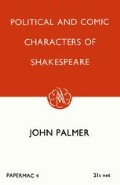Abstract
Shakespeare was born a citizen of the New Monarchy. He belonged to a generation of Englishmen who lived contentedly under the jurisdiction of Star Chamber and the Queen’s commissioners. The agents of the Privy Council were ubiquitous and their authority unquestioned. Her Majesty’s Government determined at discretion with whom her subjects were in a state of war or peace, what they should read or hear, how they should worship God, how and with whom they should trade. The man who in a Yorkshire tavern or from a pulpit in Devon uttered lewd words—which was the Privy Council’s official description of any criticism of the established order —did so at his own risk and peril. Nothing escaped the Queen’s Majesty, whose writ ran to good purpose in every hamlet and shire. A subject accepted his place; his only alternative was to be a master-less man or a vagabond. Each was content to abide by Her Majesty’s pleasure, to the loss of his goods, dignities, liberties or even his head. And if you should be condemned to a traitor’s death, you thanked God and blessed the sovereign.
Access this chapter
Tax calculation will be finalised at checkout
Purchases are for personal use only
Preview
Unable to display preview. Download preview PDF.
Copyright information
© 1946 Palgrave Macmillan, a division of Macmillan Publishers Limited
About this chapter
Cite this chapter
Palmer, J. (1946). Conclusion. In: Political and Comic Characters of Shakespeare. Palgrave Macmillan, London. https://doi.org/10.1007/978-1-349-15215-5_6
Download citation
DOI: https://doi.org/10.1007/978-1-349-15215-5_6
Publisher Name: Palgrave Macmillan, London
Print ISBN: 978-0-333-02664-9
Online ISBN: 978-1-349-15215-5
eBook Packages: Palgrave Political & Intern. Studies CollectionPolitical Science and International Studies (R0)

